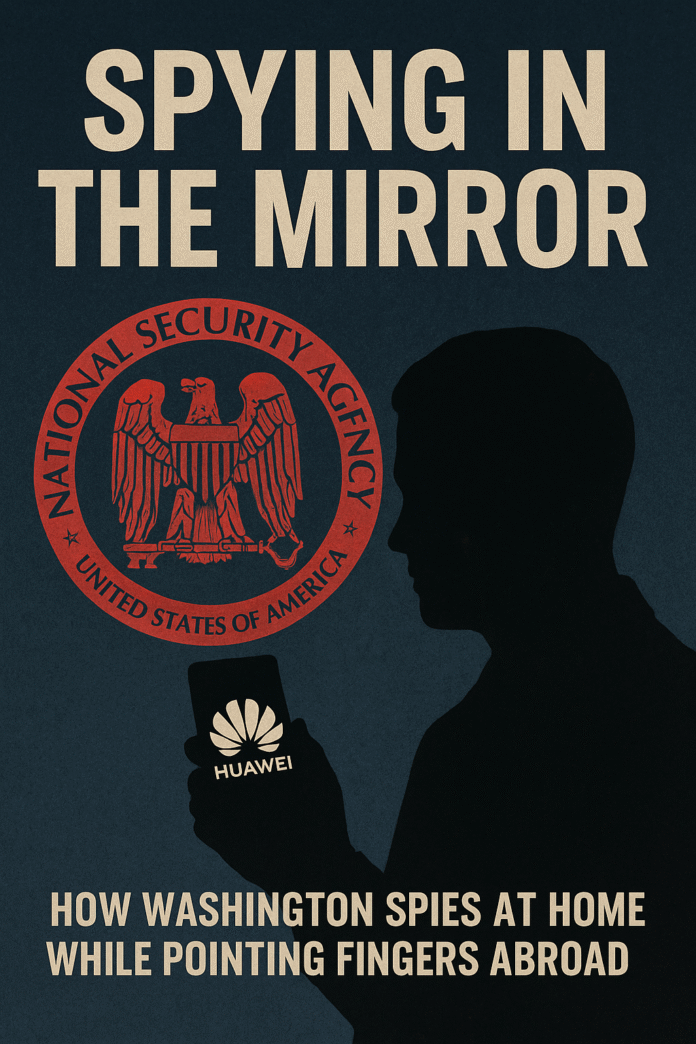For years, the United States government has painted countries like China and Russia as the looming villains of cyberspace. From Huawei’s sudden ban to endless headlines about “foreign surveillance threats,” Americans have been told their biggest danger comes from outside the homeland. But step back and look closer — and you’ll see a much darker reality: the U.S. spies on its own citizens more than anyone else, all while accusing others to keep its propaganda machine running.
The NSA’s Shadow Over America
When Edward Snowden exposed the National Security Agency’s surveillance programs in 2013, the curtain was ripped away. PRISM, XKeyscore, bulk data collection — Americans learned that nearly every email, call, and text could be intercepted, stored, and mined. The United States wasn’t just monitoring suspects. It was casting a net so wide that entire populations fell inside it.
And yet, over a decade later, the narrative persists: It’s Huawei you need to fear. Not Apple, not Google, not AT&T working hand-in-hand with government contracts. Conveniently, the NSA’s actions fade into the background while foreign companies get branded as “national security risks.”
Blame as a Tool of Power
The Huawei ban is the clearest example. Officially, Washington argued the company was a Trojan horse for Chinese espionage. In reality, Huawei was simply becoming too successful. It had surpassed Apple in global sales, threatened to dominate 5G infrastructure, and symbolized China’s technological rise. That couldn’t be tolerated. So the “security” card was played — not because Americans’ data was truly safer without Huawei, but because American corporations and influence were.
Meanwhile, Honor, Huawei’s budget-friendly spinoff, was allowed to keep operating in the U.S. The logic falls apart instantly: if the threat is Chinese law compelling backdoors, why does it magically vanish when the logo changes? The truth is that it was never about spyware. It was about kneecapping a competitor.
Propaganda in Plain Sight
The average American doesn’t see it that way. They’ve been trained not to. Every day, movies glorify U.S. intelligence agencies as defenders of freedom. News outlets frame foreign powers as scheming villains while skipping over Washington’s own manipulations. Social media algorithms amplify fear, division, and simplistic narratives.
When Americans hear “Huawei,” they think “spying.” When they hear “NSA,” they shrug — or worse, defend it. That’s propaganda working as designed: normalize domestic surveillance, demonize foreign rivals, and keep the population convinced that America’s intentions are noble while everyone else’s are sinister.
The Mirror We Refuse to Look Into
Here’s the uncomfortable truth: America is guilty of the very crimes it projects onto others, and at a far greater scale. The difference isn’t morality — it’s marketing. By selling the illusion that U.S. spying is “protection” and foreign spying is “oppression,” Washington shields its own abuses and maintains public trust.
The cycle continues because most Americans don’t question it. They scroll past headlines, retweet soundbites, consume movies, and internalize the message: we are the good guys. Meanwhile, their data, movements, and conversations remain the property of intelligence agencies that answer to no one.
In the end, the Huawei saga wasn’t about security at all. It was about power. And until Americans stop swallowing their own government’s narrative without question, the propaganda machine will keep rolling — painting enemies abroad while hiding the surveillance state at home.




